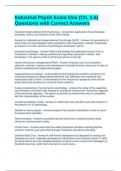Industrial Psych Exam One (Ch. 1-6)
Questions with Correct Answers
Industrial-Organizational (I/O) Psychology - Answer-the application of psychological
principles, theory, and research to the work setting
Society for Industrial and Organizational Psychology (SIOP) - Answer-An association to
which many IO psychologists, both practitioners and researchers, belong. Designated
as Division 14 of the American Psychological Association (APA).
personnel psychology - Answer-Field of psychology that addresses issues such as
recruitment, selection, training, performance appraisal, promotion, transfer, and
termination. The goal is to find or fit the best person to the job.
Human Resources management (HRM) - Answer-Practices such as recruitment,
selection, retention, training, and development of people (human resources) in order to
achieve individual and organizational goals.
organizational psychology - Answer-field of psychology that combines research from
social psychology and organizational behavior and addresses the emotional and
motivational side of work. It concentrates on the reactions of people to work and the
action plans that develop as a result of those reactions.
human engineering or human factors psychology - Answer-the study of the capacities
and limitations of humans with respect to a particular environment. Almost the opposite
of the personnel approach. The goal is to develop an environment that is compatible
with the characteristics of the worker.
scientist-practitioner model - Answer-A model that uses scientific tools and research in
the practice of I-O psychology.
Welfare-to-work program - Answer-program that requires individuals to work in return
for government subsidies
Telecommuting - Answer-accomplishing work tasks from a distant location using
electronic communication media
Virtual Team - Answer-team that has widely dispersed members working together
toward a common goal and linked through computers and other technology
Stanford-Binet Test - Answer-A well-known intelligence test designed for testing one
individual at a time. Originally developed by Alfred Binet and Theodore Simon in 1905,
the Binet-Simon test was updated starting in 1916 by Lewis Terman and colleagues at
Stanford University, which led to the test's current name.
,scientific management - Answer-A movement based on principles developed by
Frederick W. Taylor, who suggested that there was one best and most efficient way to
perform various jobs.
revery obsession - Answer-Australian psychologist Elton Mayo proposed that this
mental state resulted from the mind-numbing, repetitive, and difficult work that
characterized U.S. factories in the early 20th century, causing factory workers to be
unhappy, prone to resist management attempts to increase productivity, and
sympathetic to labor unions.
Hawthorne Studies - Answer-Research done at the Hawthorne, Illinois, plant of the
Western Electric Company that began as attempts to increase productivity by
manipulating lighting, rest breaks, and work hours. This research showed the important
role that workers' attitudes played in productivity.
Hawthorne Effect - Answer-a change in behavior or attitudes that was the simple result
of increased attention
Human Relations Movement - Answer-proposed that better human relations could
increase worker productivity
Civil Rights Act of 1964 - Answer-Federal legislation that prohibits discrimination in
hiring, firing, compensation, apprenticeships, training, terms, conditions, or privileges of
employment based on race, color, religion, sex, or national origin which define what are
known as protected groups. Prohibits not only intentional discrimination but also
practices that have the unintentional effect of discrimination against individuals of
protected groups.
American Psychological Association (APA) - Answer-The major professional
organization for psychologists of all kinds in the United States.
culture - Answer-A system in which individuals share meanings and common ways of
viewing events and objects
"West versus the Rest" mentality - Answer-Tendency for researchers to develop
theories relevant to U.S. situations, with less concern given to their applicability in other
countries.
expatriate - Answer-manager or professional assigned to work in a location outside of
his or her home country
collectivist culture - Answer-A culture that values the group more than the individual.
individualist culture - Answer-A culture that values the individual more than the group.
, Hofstede's Theory - Answer-Culture is more complex than a single continuum. There
are five basic factors on which cultures can be distinguished --
individualism/collectivism, power distance, masculinity/femininity, and long term vs.
short term orientation.
Horizontal Culture - Answer-a culture that minimizes distances between individuals
Vertical Culture - Answer-a culture that accepts and depends upon distances between
individuals
hypothesis - Answer-prediction about relationship(s) among variables of interest
disinterestedness - Answer-characteristic of scientists who should be objective and
uninfluenced by biases or prejudices when conducting research
research design - Answer-provides the overall structure or architecture for the research
study; allows investigators to conduct scientific research on a phenomenon of interest
experimental design - Answer-participants are randomly assigned to different conditions
quasi-experimental design - Answer-participants are assigned to different conditions,
but random assignment to conditions is not possible
non-experimental design - Answer-does not include any "treatment" or assignment to
different conditions. These can be observational design or survey design studies.
observational design - Answer-the researcher observes employee behavior and
systematically records what is observed
survey design - Answer-research strategy in which participants are asked to complete a
questionnaire or survey
quantitative methods - Answer-rely on tests, rating scales, questionnaires, and
physiological measures and yield numerical results
qualitative methods - Answer-Rely on observations, interviews, case studies, and
analysis of diaries or written documents and produce flow diagrams and narrative
descriptions of events or processes.
Introspection - Answer-early scientific method in which the participant was also the
experimenter, recording his or her experiences in completing an experimental task;
considered very subjective by modern standards
triangulation - Answer-approach in which researchers seek converging information from
different sources




